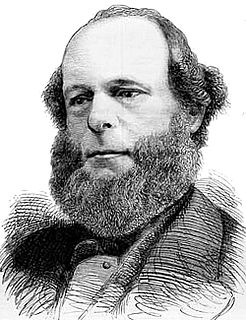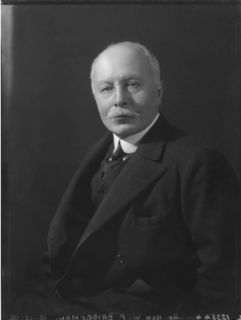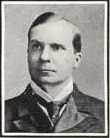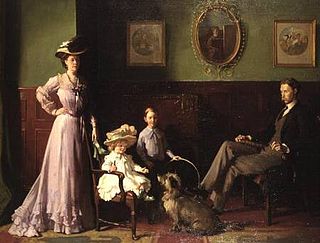William Mitchell Acworth | |
|---|---|
 | |
| Born | 22 November 1850 |
| Died | 2 April 1925 (aged 74) The Albany, London, England |
Sir William Mitchell Acworth KCSI (22 November 1850 – 2 April 1925) was a British railway economist, barrister and politician. [1] [2] [3]
William Mitchell Acworth | |
|---|---|
 | |
| Born | 22 November 1850 |
| Died | 2 April 1925 (aged 74) The Albany, London, England |
Sir William Mitchell Acworth KCSI (22 November 1850 – 2 April 1925) was a British railway economist, barrister and politician. [1] [2] [3]
The third son of the Reverend William Acworth of the Hall, South Stoke, near Bath, Somerset, and Margaret née Dundas, he was born at Rothley, Leicestershire, where his father was vicar in 1850. [1] [2] He was educated at Uppingham School and Christ Church, Oxford. He graduated with a master's degree in modern history in 1875. [1] [2] [3]
For eighteen months after his graduation he worked in Germany as English tutor to Prince Wilhelm and Prince Henry of Prussia, the future Kaiser Wilhelm II and his brother. [3] He subsequently took a post as a master in Dulwich College, where he remained until 1885. [1] [3]
Acworth became involved in Conservative and Unionist politics of London, and in 1886 he was elected a member of the Metropolitan Asylums Board. [1] [3] When the first elections to the London County Council was held in January 1889, Acworth was nominated as a candidate of the Conservative-backed Moderate Party. He was elected as one of two councillors representing Dulwich. [4] He served only one term, standing down at the next council elections in 1892. [5] In 1890 he was called to the bar at the Inner Temple. [1] [3]
In 1889 he wrote Railways of England followed in the following year by Railways of Scotland. [1] [2] These two books comprised a series of descriptive articles of the railways, but his later work concentrated on the economics and statistics of the industry. He visited the United States where he studied the statistical methods used on the railroads there, and on his return wrote his third book, Railways and the Traders (1891), which was critical of the accounting practices of the British railway companies. [3] From the mid-1890s he lectured at the newly formed London School of Economics on railways. [1] In 1905 he published his fourth book The Elements of Railway Economics, which was widely used as a textbook. [1] [2] [3] In 1919 he gave evidence to the United States Congress before the Joint Committee on Inter-State and Foreign Commerce. [1] His testimony formed the basis of his fifth and final book, State Railway Ownership, was published in 1920. [2]
He maintained his connections with the Conservative Party, and was adopted as their candidate for Keighley in the West Riding of Yorkshire. He contested the seat on three occasions in 1906, 1910 and 1911 but failed to be elected. [1] [2]
His expertise led him to serve on the Royal Commission on Accidents to Railway Servant (1899), [6] the Vice-Regal Commission on Irish Railways (1906), the Royal Commission of Enquiry into Canadian Railways (1916), the Royal Commission on South Rhodesian Railways (1918). He was also appointed a director of the Underground Electric Railways of London and of the Midland and South Western Junction Railway. [1] [2]
In 1921 Acworth was knighted and appointed chairman of the Committee on Indian Railways. [1] [7] The report of the committee, known as the "Acworth Report", led to reorganisation of railways, and the creation of a separate Railway Budget, an arrangement which is absent in British India. [8] [9] [10] He was appointed a Knight Commander of the Star of India in 1922. [1] [3] [11] In 1923 he prepared a report on Austrian railways for the League of Nations. [2]
He was married twice. In 1878 he married Elizabeth Louisa Oswald Brown, who died in 1904. In 1923 he married Elizabeth Learmonth Wotherspoon.
In 1924 he was given the task of reorganising the German Railways by the Inter-Allied Reparations Commission. The heavy workload led to a deterioration in his health, and he died suddenly at his London home at The Albany, Piccadilly, aged 74. [12]

Sir Joseph William Bazalgette, CB was a 19th-century English civil engineer. As chief engineer of London's Metropolitan Board of Works his major achievement was the creation of a sewer network for central London which was instrumental in relieving the city from cholera epidemics, while beginning to clean the River Thames. He was also the designer of the Hammersmith Bridge.

George Samuel Knatchbull Young, Baron Young of Cookham,, known as Sir George Young, 6th Baronet, from 1960 to 2015, is a British Conservative Party politician who served as a Member of Parliament (MP) from 1974 to 2015, having represented North West Hampshire from 1997 and Ealing Acton prior to that. He has served in Cabinet on three occasions: as Secretary of State for Transport from 1995 to 1997; as the Leader of the House of Commons and Lord Privy Seal from 2010 to 2012; and as Chief Whip of the House of Commons from 2012 to 2014.

George Cave, 1st Viscount Cave, was a British lawyer and Conservative politician. He was Home Secretary under David Lloyd George from 1916 to 1919 and served as Lord Chancellor from 1922 to 1924 and again from 1924 to 1928.

Richard Plantagenet Campbell Temple-Nugent-Brydges-Chandos-Grenville, 3rd Duke of Buckingham and Chandos, styled Earl Temple until 1839 and Marquess of Chandos from 1839 to 1861, was a British soldier, politician and administrator of the 19th century. He was a close friend and subordinate of Benjamin Disraeli and served as the Secretary of State for the Colonies from 1867 to 1868 and Governor of Madras from 1875 to 1880.

William Robert Wellesley Peel, 1st Earl Peel,, known as The Viscount Peel from 1912 to 1929, was a British politician.

Donald Bradley Somervell, Baron Somervell of Harrow, OBE, PC was a British barrister, judge and Conservative Party politician. He served as Solicitor General and Attorney General from 1933 to 1945 and was briefly Home Secretary in Winston Churchill's 1945 caretaker government.

William Clive Bridgeman, 1st Viscount Bridgeman, PC, JP, DL was a British Conservative politician and peer. He notably served as Home Secretary between 1922 and 1924. He was also an active cricketer.

Sir William Job Collins, was an English surgeon and later a Liberal politician and legislator.

Captain George Sitwell Campbell Swinton, CBE DL was a long-serving Scottish politician and officer of arms.

Sydney Arnold, 1st Baron Arnold was a radical British Liberal Party politician who later joined the Labour Party and served as a government minister.

Colonel Sir Charles Edward Howard Vincent, known as Howard Vincent or C. E. Howard Vincent, was a British soldier, barrister, police official and Conservative Party politician who sat in the House of Commons from 1885 to 1908.

Sir Thomas Frederick Halsey, 1st Baronet, was an English Conservative Party politician who sat in the House of Commons from 1874 to 1906.

Sir Harry Evan Auguste Cotton CIE, better known as Evan Cotton or H. E. A. Cotton, was a Liberal politician, barrister, administrator, journalist, historian and writer. His Calcutta Old and New, first published in 1907, remains unsurpassed to this day.
Sir Clement Daniel Maggs Hindley was a British civil engineer. Hindley spent much of his life working in Bengal for the East Indian Railway Company eventually becoming their general manager. He also served as India's first Chief Commissioner of Railways bringing about the nationalisation of the East Indian and Great Indian Peninsular railways, the reorganisation of the Railway Department and establishing the Railway Staff College at Dehradun. His work for the railways was recognised with a knighthood and an appointment as Knight Commander of the Order of the Indian Empire and as a Commander of the Order of Leopold by the Belgian government.

William Wither Bramston Beach was an English Conservative politician, who served in the House of Commons for 44 years between 1857 and 1901, becoming Father of the House of Commons until he was run over by a cab.

Lieutenant-Colonel Sir Francis Edward Fremantle, OBE, DL, FRCS, FRCP was a British physician and Conservative Party politician who served as the Member of Parliament (MP) for St Albans from 1919 until his death.

Sir Ernest Gray was a British educational reformer and Conservative politician.
Sir Henry William Primrose was a Scottish civil servant. He joined the Treasury in 1869, served as private secretary to the Viceroy of India from 1880 to 1884 and to Gladstone in 1886. He was secretary of the Office of Works from 1887 to 1895. He became chairman of the Board of the Inland Revenue from 1899 to 1907.
Railway budget of India was the Annual Financial Statement of the state-owned Indian Railways, which handles rail transport in India. It was presented every year by the Minister of Railways, representing the Ministry of Railways, in the Parliament.

Sir Andrew Richard Scoble (1831–1916) was an English lawyer, politician and judge.